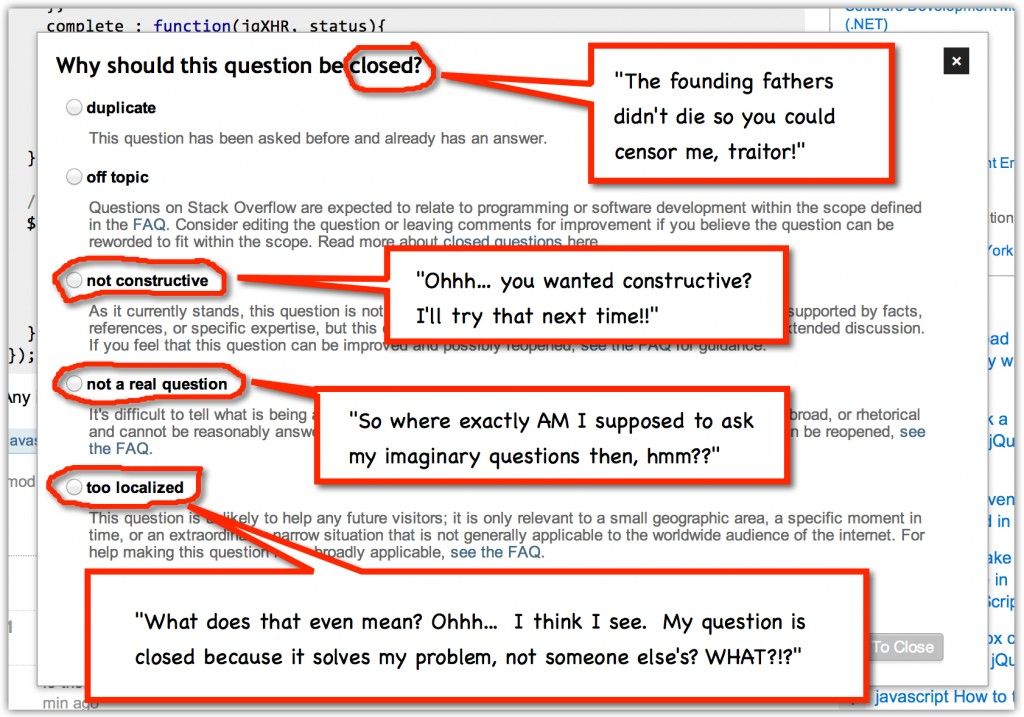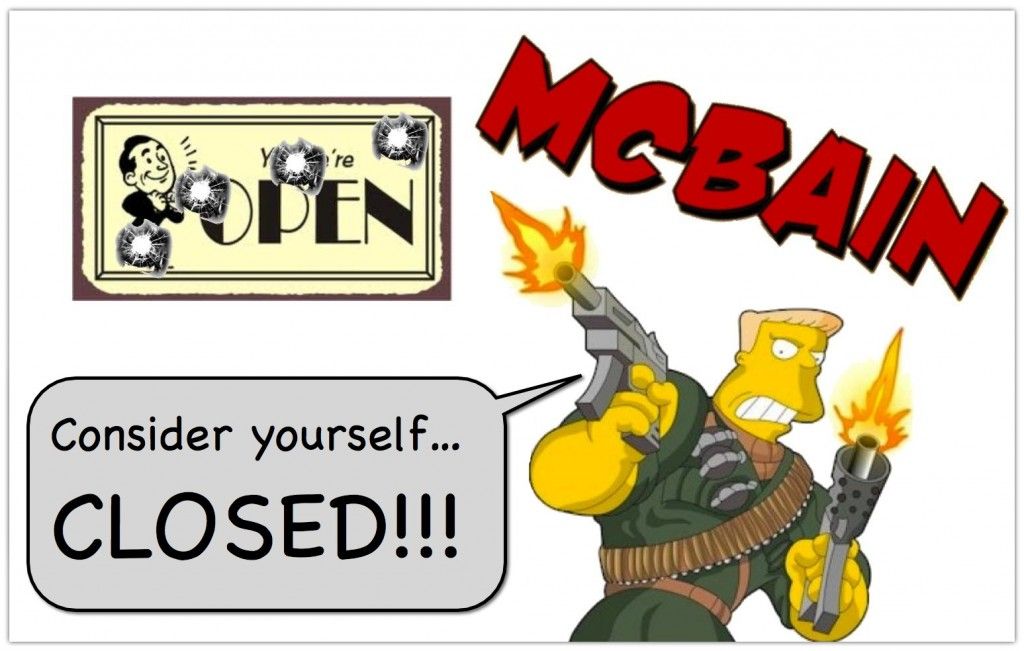It pains me when I hear people say that our sites are unfriendly, or that we chase new users away. But it's a hard problem, because our highest priority has always been the quality of content on our sites. And it still is. We can't lower our standards. We won't. But we have been working hard to make our sites more welcoming, reminding users that feedback can be clear and nice, and helping new users learn the ropesbefore they get frustrated. And, as of today, we've completely overhauled closing.
Closing, we just can't quit you.

Oh, closing. You are the watcher on the walls. You are the shield that guards the realms of men. Okay, so it's possible that I may be thinking of the Night's Watch. No matter. Closing is a big part of what separates us from other, um... less focused Q&A sites. It's what ensures that our sites remain the kind of places that experts want to be. Closing… was working. But it wasn't perfect.
Closing wasn't clear.
Our close reasons were designed for _experienced _users, but did little to help the author of the question understand what the heck was going on. Over time, as we tried to make five close reasons address hundreds of question types, they became too broad to actually convey what's wrong. Identifying the common factors of poor questions was a good idea, but we took it a little too far. It's confusing ask for help solving a specific programming problem, only to be told that it's"not about programming". Or to ask which router to buy, just to learn that you're likely to solicit "debate, arguments, polling, or extended discussion." Really? You guys take routers pretty seriously here. Now, it's not that we want those questions, but we need to convey exactly why we don't want them. Imagine if police could give out summons that, rather than, "failure to stop at a signal," just read, "behavioral violation". When feedback isn't specific, it's impossible to fix the problem, but easy to write it off as probably coming from a bunch of grumpy old jerkfaces who'd rather make you look like an idiot than actually help you.
Closing wasn't nice.
Having your question closed feels lousy; there's no doubt about it. Now, we don't care as much about nice as we do about quality - but that's not a real dichotomy. We can be more constructive in conveying our standards without lowering them one bit. And we need to, because whether we liked it or not: Having your question closed feels like a personal attack.

It is off-putting to be told that your question is "not constructive". To the poster, "not constructive" doesn't sound like polite feedback; it sounds like something a slightly detached guidance counselor might say to a child. And,"not a real question"? Does that make the listener want to get "realer" or to snarkily link to a definition of the word "question"? Ironically, we picked those terms explicitly because they were nicer ways to convey what we meant. And they were nicer than, "You're kind of ranting and being a jackass," or, "No one can answer that ambiguous nonsense." But so is prefacing my feedback to my wife with:
It could be just me, but I feel like you're acting completely nutballs crazy.
In both cases, we've gotten nicer than we started, but we're still pretty far shy of where someone might actually accept our feedback.
Fixing your closed question didn't work
The goal was always for some closures to drive an edit, improve, re-open cycle. The user gets helped, gets better at asking, and the community gets useful content. Unfortunately, since there was no way to know when a question had been improved, this almost never happened.
We can do better.
We're not going to lower our standards. But if we want to educate new users, we need get better at three things:
- make users want to improve questions, not argue about them - "terminated as too sucky; re-submit when less so," and, "needs more information, add detail to move forward" are different. One makes you want to work your way to the next stage. One makes you want to kick someone's shins.
- make it clear exactly what needs to be fixed, or is problematic, without relying on information on another page.
- provide a clear path for to get questions re-opened - questions that are brought up to our standards should get reopened.
Here's how:
- "On hold" will replace "closed" on newly closed posts The word "closed" sounded final. Think about "closed" discussions, real estate deals, or job applications. In each case,"closed" means, a) additional revisions are not welcome, and b) the matter won't be further considered.We led with a word that sounded final, so when we eventually told users they could edit their post, they weren't listening; they were dusting off the old debate uniform to argue their case."on hold" better conveys what we always meant: Questions _not _re-opened within five days will revert to displaying as "closed," to serve as a clearer signpost going forward.

If you can edit your question to better fit our model, we can get you the help you need.
- New close reasons are nicer and clearer
- "not constructive" and "not a real question" are replaced by:
too broad - There are either too many possible answers, or good answers would be too long for this format. Please add details to narrow the answer set or to isolate an issue that can be answered in a few paragraphs. unclear what you're asking - Please clarify your specific problem or add additional details to highlight exactly what you need. As it's currently written, it’s hard to tell exactly what you're asking. primarily opinion based - Many good questions generate some degree of opinion based on expert experience, but answers to this question will tend to be almost entirely based on opinions, rather than facts, references, or specific expertise.
They're much less likely to make the reader defensive, and much more specific about exactly what to fix.
- "Off-Topic" now includes site-specific close reasons Many communities have decided that some questions that sound like they fall under the topic "headline" ("cooking", "photography", etc.) should be explicitly disallowed:
- On our cooking site, recipe requests are off-topic, (but recipe replacements questions are allowed).
- On photography - "fix my picture" questions are off topic, (but specific technique requests are allowed).
- Stack Overflow is about programming, but programming questions you'd solve on a whiteboard or that ask what's wrong with a large block of code are no good.
Each example seems on-topic, but the community definition of what's allowed has been adjusted to exclude them. These nuanced definitions have always been in each site's help center (formerly the FAQ,) and are also the new user About page. And, as of today, they are also available to "off-topic" close-voters right in the close dialogue. Users can pick one from the site's list, or if none apply, they can enter a free-form one which will appear as a comment and as a choice for others voting to close the same question:
"Your question appears to be about ferret grooming, which is off-topic for Stack Overflow".
These site-specific reasons will also address situations previously covered by "General Reference" and "Too Localized". Those were the least used and most misused reasons - moderator and team sampling found a huge percentage of their application to be erroneous. (References to location in a question were particularly dangerous - never mind that a couple of billion people might live there.) But they did have some important uses:
- Questions that could be answered with a single dictionary search on English, and
- Unguided requests to debug huge blocks of code on Stack Overflow
In almost all of their good uses, they were clarifying what a community, over time, had deemed to be off-topic for their site. Programming questions,_ but not code dumps. _English language questions, but not single search definitions.
- Duplicates now focus on redirection to the answers you need All dupes now must point to an answered question, and the new language focuses on getting you answers:
marked as [duplicate] - this question has been asked before and already has an answer. If those answers do not fully address your question, please edit this question to explain how it is different, or ask a new question.
- Questions edited by the original poster automatically go to the re-open queue Once there, other users will review and can re-open improved posts. No more flagging your own question, or going to Meta to request a formal appellate review. If you make meaningful edits to your question within five days of being put on hold, it gets considered for re-opening.
Oh, one last thing.
Thank you. A ton of work has gone into this, and as usual, the best ideas came from user input on Meta, so we hope you're as proud of these changes as we are. We truly appreciate your feedback, and you've been incredibly vocal in your support for almost all of the changes. We know some of you have concerns about moving the good parts of "too localized" into the off-topic menu. We're listening, and are going to keep a close eye on it as we roll it out network-wide. In particular, we want to know if you're finding things that you can't close now, but could before, and we'll continue to adjust and iterate based on what we learn. It really seems like there should be some kind of badge for reading something this long, but the devs shot that idea down. Hard. Apparently we "will never ever offer badges to promote your endless ramblings, Jay." It would have felt nicer if they'd told me the idea was on hold. http://www.youtube.com/watch?feature=player_detailpage&v=xGytDsqkQY8#t=17s
